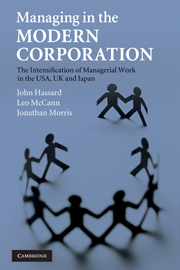Book contents
- Frontmatter
- Contents
- Acknowledgements
- About the cover
- 1 Going under the knife: Downsizing and de-layering the modern corporation
- 2 Exploring corporate life: A realist view on management restructuring
- 3 Living in the house that Jack built: Management restructuring in America
- 4 Maximising shareholder value: Management restructuring in Britain
- 5 New world of the salaryman: Management restructuring in Japan
- 6 Fighting back? Addressing the human costs of management restructuring
- Appendix
- References
- Index
4 - Maximising shareholder value: Management restructuring in Britain
Published online by Cambridge University Press: 09 February 2010
- Frontmatter
- Contents
- Acknowledgements
- About the cover
- 1 Going under the knife: Downsizing and de-layering the modern corporation
- 2 Exploring corporate life: A realist view on management restructuring
- 3 Living in the house that Jack built: Management restructuring in America
- 4 Maximising shareholder value: Management restructuring in Britain
- 5 New world of the salaryman: Management restructuring in Japan
- 6 Fighting back? Addressing the human costs of management restructuring
- Appendix
- References
- Index
Summary
[T]he shareholders and economics will finally decide what happens.
(Burchill et al., 1999: 58)It is often suggested that the UK's general economic system closely mirrors that of the United States. The UK is a highly internationalised economy with minimal governmental interference. When it comes to organisational restructuring, large firms in the UK have experienced similar forces of change to those across the Atlantic, involving downsizing, de-layering, a concerted shift towards ‘shareholder value logic’ and business process re-engineering. The UK economy is decidedly liberal, financialised and globalised.
It wasn't always this way. In the 1970s and 1980s Britain's economy was widely perceived to be in the doldrums. Unemployment, inflation, weak competitiveness of goods and services, low labour productivity and serious industrial relations unrest were readily visible. Much of UK industry was under state ownership, control, or heavy regulation, including at various times the steel, automotive, transport, utilities and telecoms industries. Subsequently, the UK has been at the forefront of economic liberalisation, involving a string of major sell-offs and, controversially, partial privatisations of core parts of the welfare system, including education and health. Until the 2008 economic recession, recent UK governments had retreated from a position of active involvement in industry and national industry policy, preferring ‘light-touch’ regulation.
The long-term and ongoing deregulation and liberalisation of the financial sector (beginning with the ‘Big Bang’ in 1986) has been critical to the internationalisation of British financial capital. European Union legislation has subsequently encouraged further liberalisation.
- Type
- Chapter
- Information
- Managing in the Modern CorporationThe Intensification of Managerial Work in the USA, UK and Japan, pp. 124 - 174Publisher: Cambridge University PressPrint publication year: 2009



